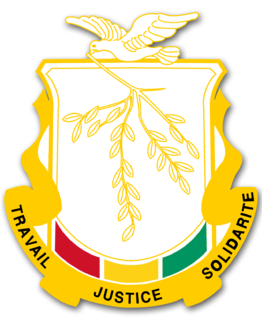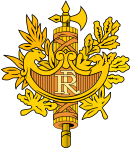A constituent assembly or constitutional assembly is a body or assembly of popularly elected representatives composed for the purpose of drafting or adopting a constitutional-type document. The constituent assembly is a subset of a constitutional convention elected entirely by popular vote; that is, all constituent assemblies are constitutional conventions, but a constitutional convention is not necessarily a constituent assembly. As the fundamental document constituting a state, a constitution cannot normally be modified or amended by the state's normal legislative procedures; instead a constitutional convention or a constituent assembly, the rules for which are normally laid down in the constitution, must be set up. A constituent assembly is usually set up for its specific purpose, which it carries out in a relatively short time, after which the assembly is dissolved. A constituent assembly is a form of representative democracy.
A four-part referendum was held in Ukraine on 16 April 2000. The referendum was called by President Leonid Kuchma, and asked voters whether they approved of four amendments to the constitution that would increase the powers of the President and introduce an upper chamber.

A four-question referendum was held in Belarus on 14 May 1995, alongside parliamentary elections. The four issues were the possibility of giving the Russian language equal status with Belarusian, whether new national symbols should be adopted, whether there should be economic integration with Russia and changes to the constitution that would allow early elections if Parliament systematically violated the constitution. According to official results, all four were approved by at least three-quarters of voters, with a turnout of 64.8%.

A seven-question referendum was held in Belarus on 24 November 1996. Four questions were put forward by President Alexander Lukashenko on changing the date of the country's independence day, amending the constitution, changing laws on the sale of land and the abolition of the death penalty. The Supreme Council put forward three questions on constitutional amendments by the Communist and Agrarian factions, local elections and the national finances.

A referendum on the enlargement of the EC was held in France on 23 April 1972. Voters were asked whether they approved of Denmark, Ireland, Norway and the United Kingdom joining the EC.. The proposals were approved by 68.3% of voters, with a turnout of 60.2%.

A constitutional referendum was held in France on 5 May 1946. Voters were asked whether they approved of a new draft Constitution proposed by the Constituent Assembly elected in 1945.

A constitutional referendum was held in France on 13 October 1946. Voters were asked whether they approved of a new constitution proposed by the Constituent Assembly elected in June. Unlike the May referendum, which saw a previous constitutional proposal rejected, the new constitution was accepted by 53.2% of voters, and brought the French Fourth Republic into existence. Voter turnout was 67.6%.
A referendum on the Order law was held in Luxembourg on 6 June 1937. Voters were asked whether they approved of the new law, which would ban any political party that sought to change the constitution or national legislation by violence or threats. The law would result in the dissolution of the Communist Party, and became known as the Maulkuerfgesetz.

A constitutional referendum was held in Poland on 25 May 1997. Voters were asked whether they approved of a new constitution. It was narrowly approved, with 53.5% voting in favour. Voter turnout was just 42.9%. Although the 1995 Referendum Act stated that a 50% turnout was required to validate the referendum, the Supreme Court ruled on 15 July that the constitution could be introduced.

A constitutional referendum was held in French Dahomey and French Togoland on 21 October 1945 as part of the wider French constitutional referendum. In the two territories both questions were approved by large margins. Voter turnout was 83.5%.

A consultative constitutional referendum was held in Moldova on 23 May 1999. It was initiated by President Petru Lucinschi and asked voters whether they approved of changing the system of government to a presidential system. The proposal was approved by 64.2% of voters. However, the Party of Communists of the Republic of Moldova and the Alliance for Democracy and Reforms opposed Lucinschi, and were able to vote several constitutional changes through parliament on 5 July 2000. The changes reduced the powers of the president and strengthened the parliament and government.

A constitutional referendum was held in Ivory Coast on 21 October 1945 as part of the wider French constitutional referendum. Both questions were approved by large margins. Voter turnout was 74.9%.

A constitutional referendum was held in French Somaliland on 21 October 1945 as part of the wider French constitutional referendum. Both questions were approved by large margins. Voter turnout was 73.4%.
A constitutional referendum was held in Gabon and Moyen Congo on 21 October 1945 as part of the wider French constitutional referendum. Both questions were approved by large margins. Voter turnout was 68.1%.

A constitutional referendum was held in Guinea on 21 October 1945 as part of the wider French constitutional referendum. Both questions were approved by large margins. Voter turnout was 73.5%.

A constitutional referendum was held in French Cameroons on 21 October 1945 as part of the wider French constitutional referendum. Both questions were approved by large margins. Voter turnout was 71.1%.
A constitutional referendum was held in Chad and Ubangi-Shari on 21 October 1945 as part of the wider French constitutional referendum. Both questions were approved by large margins. Voter turnout was 83.5%.
A constitutional referendum was held in Mauritania and Senegal on 21 October 1945 as part of the wider French constitutional referendum. The first question on the new French National Assembly serving as a constituent assembly was approved by 99% of voters, but the temporary constitution proposed in the second question was rejected by 51% of voters. Both proposals were approved in the overall vote. Voter turnout was 60.4%.
A constitutional referendum was held in French Sudan and Niger on 21 October 1945 as part of the wider French constitutional referendum. The first question on the new French National Assembly serving as a constituent assembly was approved by 97% of voters, whilst the temporary constitution proposed in the second question was approved by 86% of voters. Both proposals were also approved in the overall vote. Voter turnout was 79.3%.

A constitutional referendum was held in Tunisia on 21 October 1945 as part of the wider French constitutional referendum. The first question on the new French National Assembly serving as a constituent assembly was approved by 99% of voters, whilst the temporary constitution proposed in the second question was approved by 79% of voters. Both proposals were also approved in the overall vote. Voter turnout was 69.2%.












